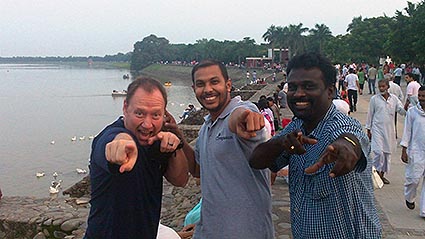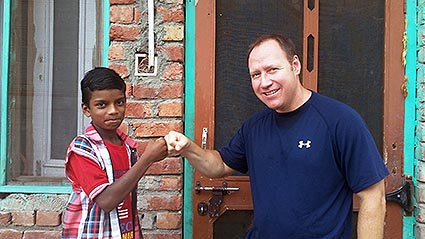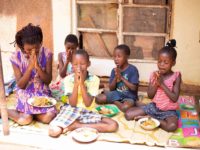Derek is one of our whizzes who works in Complementary Interventions. He is seriously committed to Compassion — he interviewed for five jobs here over four years before he was hired! He’s one of the people God is really using at Compassion through his wisdom, calling and commitment.

How long have you been at Compassion and what is your role?
I’ve been here almost three years, and I’m the Complementary Interventions Strategy and Operations Manager. I’m responsible for supporting our field countries in developing strategies for CIV — Complementary Interventions.
Can you explain what Complementary Interventions are?
Compassion is primarily known for sponsorship, but the other side of what we do is Complementary Interventions, a program that includes things like disaster response, medical care and malaria nets. We receive about $45 to $50 million a year for CIV, so there is a lot of coordination that has to happen.
There are so many needs that a field office can easily be overwhelmed by the need compared with the limited pool of funds. So we really have to be targeted and focused on how we can have the greatest impact on our beneficiaries.
How do you work with the field to make those decisions?
We support the field offices to determine if there’s one problem or one significant issue that they think is keeping our sponsored children from reaching the outcomes we’d like to see in their lives.
For example, in Ghana, malaria keeps kids out of school. But the kids who get a bed net are seven times more likely to stay healthy and stay in school longer.
Or in Uganda, HIV is a significant problem in many of the communities where we work. Many times, we find HIV-positive moms who are raising their children alone without an income. So Complementary Interventions help to fill that gap by teaching the mothers income-generating skills so that their children can have a stable home.
How are Complementary Interventions similar to or different from community development?
What we do isn’t community development. Community development asks what a community needs to develop economically, in policy and in structure. Its focus is broader.
Our focus is narrow — on the child. We ask what a child needs to thrive, grow and survive. The needs that we fund are specific to our sponsored children’s lives, such as the need for latrines at the child development center, the need for water filters in their homes, or their need for medical care.

What did you do before coming to Compassion and how did you end up here?
I worked for 12 years in the nonprofit sector in marketing and communications and in the international sector managing impact projects around the world. I felt called to work at Compassion.
I applied to five jobs in four years and was the final candidate four of the five times. I was committed and still felt called through all those years of not getting a job. That process was about learning God’s timing and not giving up on Compassion. If anything, over those years, my call to serve the poor only became stronger.
What’s something you have experienced in your role that has really impacted you?
I was in Tanzania at the end of a food distribution in response to the drought that has been going on for several years. Most places where we work were protected because of preventative measures, but I visited an area outside of Arusha that was heart wrenching.
I’ve never seen dry like this, though I’ve been around the world numerous times.
When we got out of our Jeep, the sand was such a fine powder that it filled my shoes ankle deep. It coated everything: every tree, every fence post, every house. You couldn’t walk 10 feet behind someone because the dust kicked up would choke you. It was depressing and ominous.
We visited a home where there was a grandmother caring for her 10 grandchildren. Three of her children had died because of AIDS, and so she was caring for all her grandchildren alone. It was painful to hear her story.
One of her grandchildren was sponsored by our ministry, so they got corn, beans, rice and other food. She was wondering how she would ration the food to make it last. She decided she wouldn’t eat any, but would just eat dried corn husks so that the children could have it all.
But then her neighbors found out she had food, and showed up at her doorstep. She said, “I love them. They’re my neighbors and friends and family.” So even out of her own desperation, she gave a third of the food away to her neighbors.
How did this experience impact you?
It has exposed my own selfishness. I’ve wondered if it were my own kids who were starving, how much would I want to hoard the food for them and take care of myself rather than helping my neighbors? There wasn’t a hint of hesitation with this grandmother. She knew that she loved her neighbors and that she was going to care for them.
What would you like sponsors to know?
There is no one answer to poverty. From what we know, it takes sponsorship, and it also takes things like Complementary Interventions. You can become a Partner of Compassion for $7 a month to help support these projects.
Poverty is complicated. If you hear that one intervention didn’t solve it, don’t be discouraged. Just as when we raise our own kids it takes many interventions and many years, it takes a long time and many interventions for Compassion to help develop a child as well. Transformation takes time.







1 Comment |Add a comment
We celebrate you Derek and the role Complimentary interventions is playing in releasing children and their families from poverty.Keep up the good work.